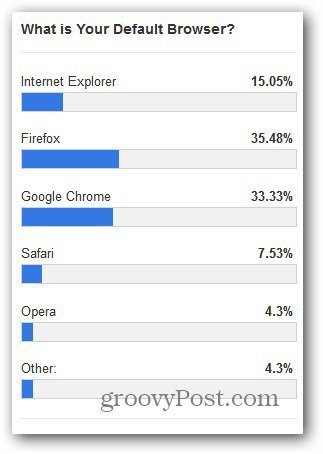Here are the results. Out of 179 votes, Firefox won a modest victory with 35.48% of the votes. Google Chrome had a respectable second place showing with 33.33 percent. Internet Explorer was third with 15.05 percent and Safari nabbing the fourth spot with 7.53 percent.
The competition between Firefox and Chrome from our poll are akin to national statistics. According to NetMarketShare, Chrome and Firefox are currently running in a tight race. Where our poll did not correlate with national browser statistics is with the dominance of Internet Explorer. In the corporate world, many proprietary business applications only work with IE, so employees are required to use it.
What You Said
Here’s what some of you said about the browser you use.
ShockerSH: “Firefox for the win. I was using Google Chrome for awhile but got hooked back into Chrome due to all the awesome Firefox plugins.”Ziggy: “Went off Firefox some time ago when they introduced multiple updates, although the kids still love using it because each can have their own Profile. Chrome also has this feature, which I use from time to time. As for my main browser I use Internet Explorer 9. Has never caused issues or broken down, unlike some iterations of Firefox. Tried Opera and Safari, but they’re not as good as IE9. I found those two browsers to be quite cumbersome and not so user-friendly.”Harry: “I use Firefox, most of the time. I also like chrome for some special features, but the only thing I’ve been unable to get over is the chrome tab bar. It must be below the address bar. The day chrome gives me the option to move the tab bar below the address bar (just as in Firefox), I’ll start using chrome and maybe stop using FF because it is often too resource heavy.”Terry Hollett: “I prefer Opera. SeaMonkey would be my second choice.”
While Firefox and Chrome were the most popular, there were other alternative browsers some of you mentioned like SeaMonkey and Maxthon mentioned by groovy’s own Ron White. For more alternative browsers out there, take a look at our article on alternative browsers you may not have heard of. Of course, this poll was completely unscientific and if we held it longer, Chrome may very well have won. As the Internet and browsers continue to evolve we’ll likely see major shifts in the type of browsers people use. Remember back in the 90’s IE and Netscape were the two top browsers.
When I brought these errors to the attention of Net Apps, to their credit, they created distinctions between Maxthon and the two main browers that use the same rendering engines Maxthon does. The problem today is that the distinctions only turn up in a more detailed report that Net Apps charges to see and that the public and the press usually don’t know exist. The differences aren’t going to change the colored lines in the graph by much, but they do have an effect in Europe, where the browser ballot incorrectly puts Safari for Windows in the top five Windows browsers instead of Maxthon. With the deck stacked against it in the market, it’s a wonder Maxthon has done as well as it has. And it wouldn’t have if it weren’t a superior piece of software. Comment Name * Email *
Δ Save my name and email and send me emails as new comments are made to this post.
![]()


